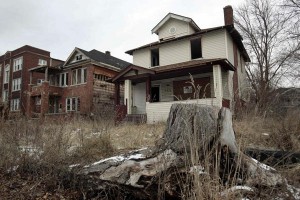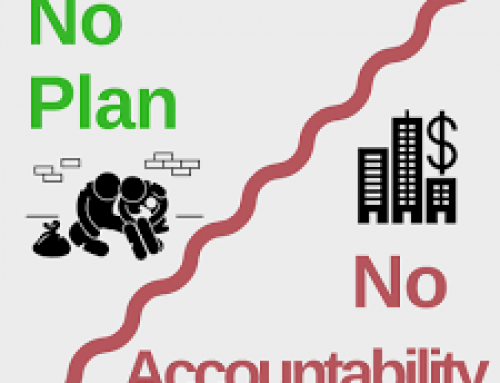July 19, 2013
By: Kelly Diamond, Publisher
The market, much like gravity, has its laws… and will ultimately have its way. Detroit is no exception.
Propped up by our once successful auto industry, and investor faith in it, the weight of Detroit’s unions and over-extension in public sector employment and benefits proved to be more than cars and good faith capital could support.
 I worked in Detroit for nearly 2 years. My client was GMC Truck, and I created media campaigns for about 20 local markets in the Western Region of the United States. When I was there, GM hadn’t yet filed for bankruptcy and the government handout. The “G” still represented “General”… not “Government”.
I worked in Detroit for nearly 2 years. My client was GMC Truck, and I created media campaigns for about 20 local markets in the Western Region of the United States. When I was there, GM hadn’t yet filed for bankruptcy and the government handout. The “G” still represented “General”… not “Government”.
It wasn’t the fault of Starcom MediaVest that GM failed. We were killing it in market share! Every index indicated that people: 1. Knew about GM, 2. Heard the messages of various deals, and 3. Cars were selling.
So what happened? Well, if the Chevy Volt was any indication, they were selling the car for less than what it cost to build it just so they could compete price wise against other auto makers like Toyota.
Sadly, GM was only a model for the city of Detroit. Not so different from obesity, it takes time to get there. You don’t just wake up one day morbidly obese. A series of choices get you there. Well, Detroit is now getting its proverbial bell rung. The diagnosis: Bankruptcy.
There is a divine element to market forces, however. In some cases, businesses perish. Some due to the outdated nature of their products/services. Others for their mismanagement. The businesses who are sent out to pasture are often replaced with better ones: better service, better management, more efficient model, etc. But sometimes, individuals can swoop in and right the wrongs, thus salvaging the business. Similar to liver cells, it is regenerative. The market heals itself, and this is what Detroit ultimately has to look forward to!
Detroit is bankrupt, on that there is no equivocation. It really doesn’t take a PhD in Economics to figure out the causes which lead this once-great city down a path to bankruptcy. Perhaps no degree in economics is what it takes, because the internet is teaming with “reasons” that look more like Effect than Cause.
People, and their wealth, have been fleeing Detroit in DROVES since the Detroit Riots in the 1970’s. And when the tax base of any city is chopped to a fraction of what it was, basic public services become all but nonexistent: hour long wait for a 9-1-1 response; trash not being collected; half the ambulance fleet in disrepair; abandoned buildings.
The only folks left, are poor, many of whom don’t pay taxes (some can’t, some won’t). Detroit suffers decades of corruption starting with Coleman Young all the way through the most recent mayor, Kwame Kilpatrick, who is currently facing these charges:
- One count of racketeering conspiracy, punishable by up to 20 years in prison;
- Eight counts of extortion, punishable by up to 20 years in prison; $250,000 fine
- Two counts of bribery, punishable by up to 10 years in prison; $250,000 fine
- 13 counts of mail and wire fraud, punishable by up to 20 years in prison; $250,000 fine
- Five counts of filing false tax returns, punishable by up to three years in prison; $100,000 fine
- One count of income tax evasion, punishable by up to five years in prison
Where there is extreme poverty, there is crime. No one is willing to bail out or even lend money to this dilapidated city in free-fall. Detroit has bottomed out. It is right to file bankruptcy and wipe the slate clean. Granted, it won’t be pretty at first, there are some indications of free market healing as well as a wealth of opportunity and potential to make that city great in a relatively short period of time.
I know this sounds either trite or extreme, but look at Somalia! That’s where all libertarians are directed when they clamor for the elimination of a welfare state. The political issues surrounding Somalia are that of battling warlords who seek dominion over the Somali people. The actual Somali society at large, however, is quite peaceful and prosperous without a central government, and has been since 1991. They aren’t lawless, they just operate on customary law rather than political law.
Somalia’s telecommunications are the best in Africa, its herding economy is stronger than that of either of its neighbors, Kenya or Ethiopia, and that since the demise of the central government, the Somali shilling has become far more stable in world currency markets, while exports have quintupled.
Customary law has some cultural influence of course, but by and large this is an example of how a society can rise up out of the ashes of political turmoil either though something as informal as customary law, or in Detroit’s case maybe good ole spontaneous order!
There is a lot of free market activity sprawling in Detroit. They are 100% privately funded (i.e. no government subsidies to a privately held company). Threat Management Center (TMC) is the new private security business. “TMC now has a client base of about 1,000 private residences and over 500 businesses. Thanks to TMC’s efficiency and profitability, they are also able to provide free or incredibly low-cost services to the poor as well,” writes Robert Taylor of Policymic.com. They are far more efficient and effective in their operations, since they do not assume a para-military role in the community as state police do. They only respond to calls, and force and violence are a last resort.
The Detroit Bus Company is the latest in public transportation. They repurposed buses, decorating them with street art and graffiti. They offer wi-fi, and rather than follow one set route, you can just call or text them for pick-up via a live-tracking app. They run on bio-fuels provided by local restaurants.
Busted as the city of Detroit may be, they are still finding the time and resources to quell free-market efforts. The Detroit Enterprise Academy decided to donate bus benches complete with bookshelves and donated books, and Detroit Department of Transportation was quick to deem these contributions as “unapproved”.
But other activity is stirring! A bankrupt government means a limited government by default. So while they may find the bandwidth to stop bus bench donations, there are, “food rebels, running local community gardens, an alternative to Big Agriculture and government-subsidized factory farms. Private parking garages are popping up. Detroit residents are using Lockean homesteading principles to repurpose land amongst the rubble of the Fed-induced housing bubble. Community events like Biergartens and large, civic dining gatherings (with no permits or licenses!) are being organized privately. Even Detroit’s artists are beginning to reflect this anarchic, peaceful movement in their artwork.”
Bankruptcy is the inevitable outcome of political gaming. It is also the vulnerable spot of any government. There used to be might to back the edicts of Detroit’s government. Now, they can’t afford to enforce their own nonsense, thus rendering themselves rather irrelevant. Before a new city government can be formulated, there will already be a peaceful order. If the remaining citizens of that area know what’s good for them, they will resist a new government. They will defend the locals who didn’t abandon their community, but instead, resuscitated it with new life.




